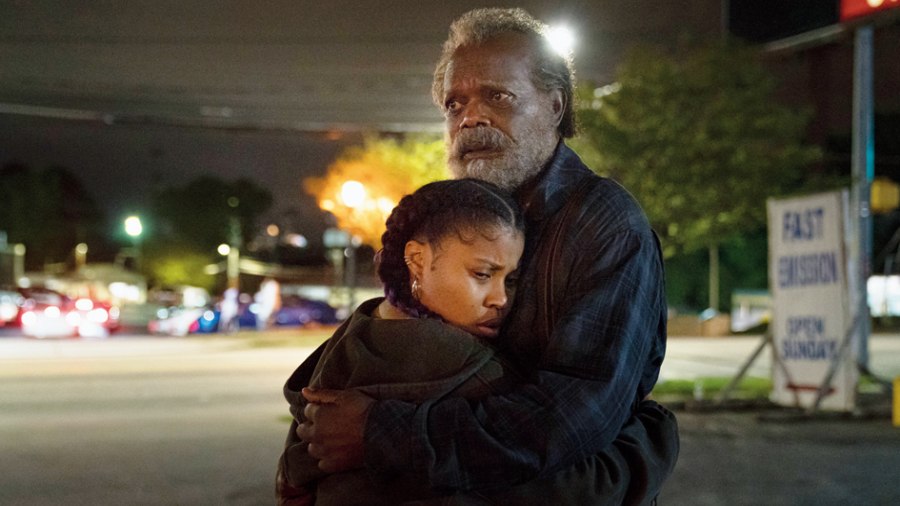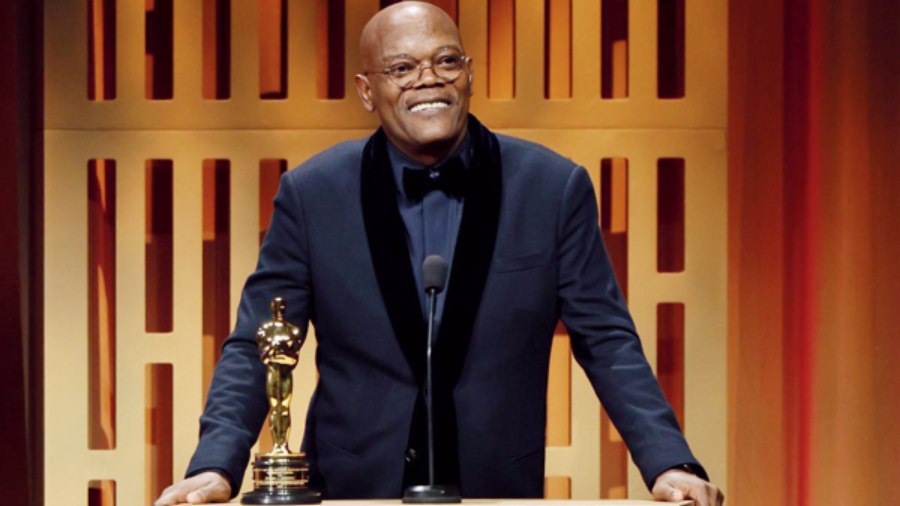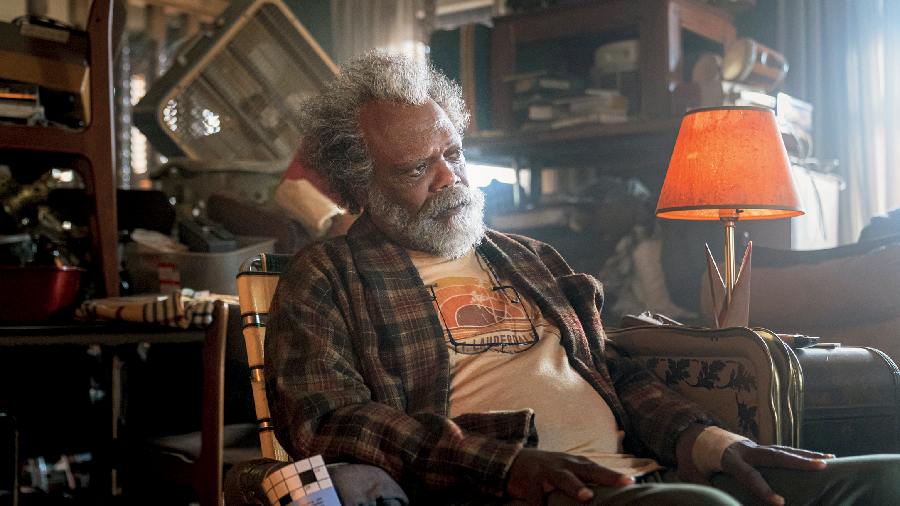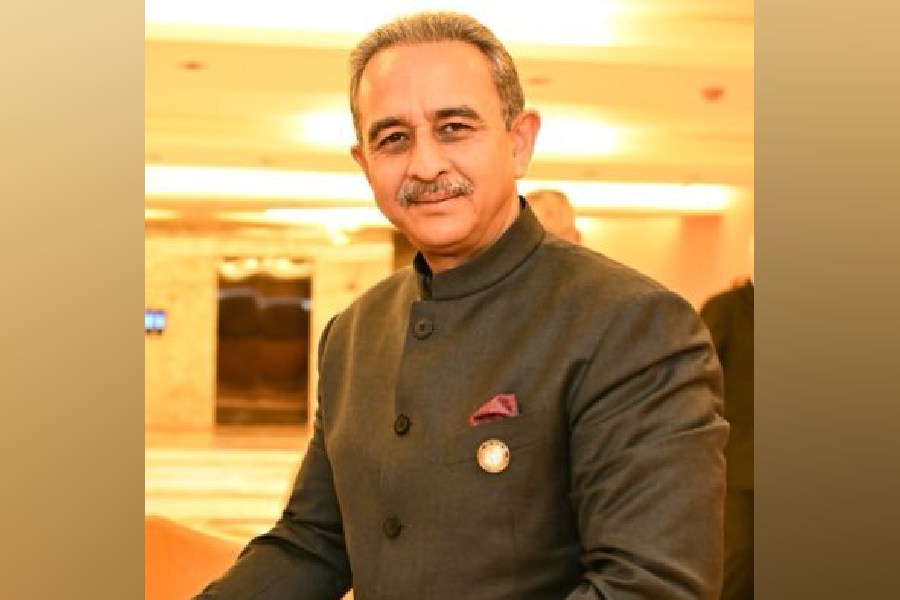It has been a life well lived,” Samuel L. Jackson had said when he was asked to sum up his life a few years ago. For many, the 73-year-old is more than an actor, a fantastic actor, an icon… he is a genre in himself. What has made him appeal across generations is his childlike curiosity on screen, always wanting to do his job differently. And differently he does it once again on The Last Days of Ptolemy Grey, which deals with a weighty subject and brings out the best in the man.
For Jackson, the Apple TV+ show is perhaps the culmination of a lifetime of reality he had to deal with — the thought of Alzheimer’s, which has affected several of his family members. His grandfather — who was also his “best friend when I was growing up” — was the first in the family to be affected. Then his uncle was diagnosed with the disease, followed by his mother and then his aunt.
Playing Ptolemy Grey wasn’t easy, something he was always aware of. Adding to the difficulty was the fact that it’s based on a Walter Mosley book, a writer whose style has defined a generation, one that hasn’t lapsed into mannerism. The novel is lucid, moving and has its share of punches. The same holds true for the show.

Dominique Fishback as Robyn in The Last Days of Ptolemy Grey
‘There are people who will be able to relate to this situation’
A fragile 91-year-old Ptolemy Grey lives alone in squalor with roaches having a rule of the house. Suffering from dementia, he is dependent on his great-grandnephew Reggie for the basic necessities of life. But the sudden death of his caretaker brings Robyn (played by the fantastic Dominique Fishback), an orphaned youngster, into his life. Still clinging on to some memories, Grey still has a chance at tying up a few loose ends but the opportunity comes with a caveat.
“I am from a family in which I am surrounded by people who have Alzheimer’s, so my grandfather, my uncle, my aunt, my mom.... I have watched them change, deteriorate and become different people,” Jackson said during a late-night video call when The Telegraph had an opportunity — as part of Television Critics Association (TCA) Winter Press Tour, on a virtual invitation from Apple TV+ — to hear from the veteran actor about how the show has been in the works for long.
“There are people who will be able to relate to this situation; they need an outlet to look at someone else dealing with those problems and things, and see a young person like Robyn to come in and access this person, and to look at that person and understand they are worthwhile. Some people’s garbage is another person’s treasure. She comes in when his family kind of discards him and treats him like an unvalued individual,” said the man who has had an enviable streak in Hollywood.
The Last Days of Ptolemy Grey is wrought with allegory and tragedy, yet the show doesn’t feel heavy because of the different tracks in the plot. On the one hand are fragmented memories of his beloved wife, his childhood and issues about identity. The other involves the arrival of Robyn who makes Grey believe that respect is still alive. And there’s a third track. He meets a physician who is conducting experiments with a drug that can tackle symptoms of senile dementia but it comes with a side effect — after a few weeks of lucidity it will be death. It’s sort of a Faustian bargain where, in a way, the soul is sold to the devil in exchange for power and knowledge. Here knowledge is about who killed the caretaker Robyn replaced.

Samuel L. Jackson as Nick Fury
Living with the character for a decade
The character of Grey stands in contrast with the other dynamic characters in Jackson’s repertoire — Jules Winnfield, who in Pulp Fiction mouthed vulgarities and obscenities as offhandedly as he shot people, the fast-talking Ordell from Jackie Brown or the cool Nick Fury in Iron Man, The Avengers and other films. Grey is different.
“All the characters I have played mean something to me. Even characters I repeat, like Nick Fury, I repeat him a lot but I know he is easy to access… even Ptolemy is easy to access. I read the book several times. I read the book at a lot of different times, in different time periods when we were trying to get this made and they wanted to make it an hour long or 1.5 hour-long movie, which is impossible. I was always banging my head against the wall because I never wanted to tell the story that way. Ptolemy fits into the real-life chronology of my life in terms of honouring all those people in my life who had Alzheimer’s and all the people who I have met in places where my mom was and other people. It’s an honest and hopefully an endearing assessment of the deterioration of life for a lot of us who feel in a personal way with someone in the family who has Alzheimer’s.”
Jackson has immense respect for Walter Mosley, whose work has an important imaginative part, like a cure for dementia even if it’s for a few weeks. A few weeks ago Mosley told The New York Times: “That’s the great thing about imaginative creativity. You look at Jules Verne: He’s the guy who invented the [electric] submarine, who invented the rocket to the moon. He invented all of this stuff in his imagination, and of course, it’s stuff we wanted. I was reading the newspaper yesterday, and they said umbilical cord stem cells have cured a woman of AIDS. This one woman is cured, and they did it from umbilical cord stem cells. If you put the possibility out there, lots of people are going to be thinking about it.”
The actor touched upon this imaginative side with us and said: “I have been preparing for a long time and I have been wanting to do this role for a very long time. I have seen this series for about 10 years in my head. So when it was time to do those things… it kind of turned on the emotional aspect.
“The point is, Walter created a drug and a person who comes with a cure and it’s temporary. It’s not a real thing; it’s a story of guy and what if we could do this. It’s almost like a fairy tale of a guy who had Alzheimer’s and he had an opportunity to not have it for a while and he did, and this is what he did (track a killer). He rediscovered a period of his life that was important to him. But it’s based in the reality of someone who has lost himself over the years, who rediscovers things about himself and she (Robyn) helps him achieve it. So that’s the fanciful part which helps people to come out of the heaviness of the story about who Ptolemy is. It’s a mystery he solves that is nagging, dragging him more than anything else. If he doesn’t solve it, then he wouldn’t fulfil his purpose in life. She helps him do that. He deteriorates and goes back.”
The series also shows the depth of Dominique Fishback, who plays Robyn, who keeps trying to clear out the fog — even if it’s for a short period — around Grey by being patient. Jackson, of course, is always charismatic in his own way, while Fishback offers a nuanced performance. The two go around Atlanta taking care of business, which also involves another element in the plot — looking for buried treasure, which is entertaining.
“I met Dominique through my wife and I watched her. I called my manager and said I found Robyn. I was so happy that she had time on her schedule; she really wanted to do it. The relationship between the two of us… to laugh and talk between shots… she is a very focussed and different kind of an actress than most of the actresses I have met. She embodies the character in a way that a lot of people don’t,” Jackson said.
He also had something to learn from Dominique. “I learnt from her that there is this young generation of actors who are coming in and who have found a way to present themselves to audiences that know them. When she showed up, she showed up!”
The actor went on to explain how the series didn’t get shot in a linear fashion, meaning all the episodes were being shot simultaneously. But Dominique aced it. “When you find the right person to work with, who embraces the goal of a particular scene… movies and TV series have things that give way to a flow but each scene takes you to a new place and when that person comes in there, you look at that person and start to share that space with a genuine emotional arc; you try to accomplish what needs to be accomplished that moment. Dominique was there to do that. Today we want to go from Point B to Point D past Point C and because you don’t shoot in order, we were block shooting… suddenly we were shooting episode five and then episode two, you have to have put in enough time to have read the script and understood it, and know that you can bounce from this thing to that thing so that you can connect tissues. That takes sequencing in your mind.”

I’m really, really proud to receive this statue. Who knows, that little kid from Chattanooga, Tennessee, watching movies, wishing he could be here to get the votes of people who run an organisation like this (The Academy) that says, ‘Hey, I deserve something like this.’ Thank you, so much — after being awarded an honorary Oscar as part of the annual Governors Awards this year
The most important asset
Turning a book into a series is never easy. When you are writing fiction, you don’t have to worry because the characters move at their pace. “But on a show you have to make sure that revelations work out for the audience and the other thing is that we are making a show… I don’t have the freedom to be, you know, now I am going to a beach in Santa Monica or be on the mountains. You have to say ‘Listen, what I am going to do, how I am going to do it, make things fit into place. Everybody involved was so good and they all wanted to make it happen.”
For Jackson, the reality remains that many of his family members have been affected by Alzheimer’s. He has had to deal with the fact that it’s the part of life when loved ones may not answer questions or be present for what we want them to be present for. They are people who want to engage when they feel like it.
Playing the 91-year-old has made him think of ageing, about Alzheimer’s and about ways to cope with ageing. “There are a lot of things that will sound funny. I would say that I was fortunate to have been blessed with a really different gene pool. Yes, there’s a lot of Alzheimer’s in my family but (these are) people who lived a long time. I have a 94-year-old aunt in LA who can take credit for everything I do in my life because she is the first person who made me act or recite something. She takes full credit for that. She is vital. She is there, mentally alive. My mom, my grandfather and all the people in my life who had Alzheimer’s… she got nothing. Understanding how to take care of yourself is important. I have discovered the value of sleep. I used to sleep three hours a night once upon a time. But sleep is so valuable. I treasure it now. Reading, making sure my mind stays active…. Giving myself an opportunity to exercise my mental capacity in the same way people exercise their body; there are a lot of different things. Fortunately, I have made enough money for people to massage me, do acupuncture… all these things will hopefully keep me vital for at least another 20 years,” said the 73-year-old actor.
Appreciating life and the present moment are important to the actor. “Quality of life at a certain age is important. That I am being able to move and relate and comprehend, it is something valuable. Quality of life is the most important asset that you have.”











